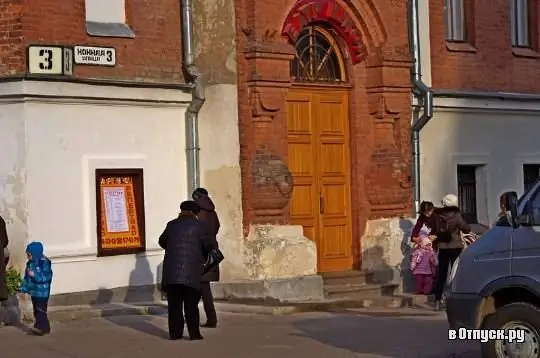
Description of the attraction
The puppet theater was officially founded on October 1, 1963 by two enthusiasts named Taisiya and Vladimir Pavlov. They were the pupils of the famous puppeteer director, whose name is Yevgeny Demmeni. This actor, director, Honored Artist of the RSFSR was known throughout the Soviet Union. He was the first Russian professional puppeteer director, one of the founders of the Soviet puppet theater. He was also involved in pedagogical work and brought up more than one generation of puppeteer artists. It is not surprising that it was his students who became members of the first Pskov puppet theater troupe, which existed long before the theater's official opening date. They were studio graduates under the leadership of E. V. Demmeni at the Leningrad Puppet Theater. After the end of the Second World War, in 1945, the graduates united into a troupe and staged their first performances.
However, the theater did not have its own premises for a long time. At first, it was housed in the premises of the Pskov Drama Theater, then - in the concert and variety bureau. In 1950 the theater was disbanded. There were no performances for three years. And in 1953 the performances resumed. Three of the artists from the old troupe joined the new one.
In 1963, the theater finally acquired its own premises and moved to the Batov House. In this building, an architectural monument of the early 20th century of federal significance, the theater is still located today. It was built at the end of the 17th century and at first belonged to the Trubinsky merchants of Pskov. The building consisted of several buildings and was one-story. Then it was combined into a single room and a second floor was added. At the beginning of the 20th century, Batov became the owner, under which there was a prayer house. During this period, significant reconstructions were carried out and another two-story building was added. These two adjoining buildings form an obtuse angle, with the building being L-shaped from the north and rectangular from the south. The different styles of both cases are in perfect harmony with each other. The northern building is decorated in the late provincial Art Nouveau style, while the facade of the southern one is dominated by features of classicism and early Italian Renaissance. The theater is located in the northern part of the ensemble.
For almost 50 years of the official existence of the puppet theater, many directors have changed. Among them were residents of Pskov, and those who came from other cities. But almost each of them left behind at least one performance, which entered the golden treasury of the theater, among them - V. A. Kholin, F. Z. Feinstein, V. G. Miodushevsky, A. A. Veselov, A. A. Zabolotny and many others.
In the late 20th - early 21st century, the Pskov Puppet Theater achieved particular success and achieved a certain fame, both in Russia and abroad. The theater has taken part in many national and foreign theatrical competitions, and has repeatedly become their laureate. Today the puppet theater is headed by the director, Honored Artist of Russia, laureate of the national theater award "Golden Mask", Evgeny Bondarenko. 9 puppeteers work under his leadership.
Recently, it has become a kind of tradition to celebrate the day of the puppeteer and to hold an annual master class for children on the puppeteer's acting skills, timed to coincide with this holiday. It is conducted by the director of the theater together with his artists, who teach children how to handle dolls and share the secrets of their work.
In the work of the director and artists of the Pskov Puppet Theater, there has always been a place for innovation. These are modern decorations, and unusual elements of the production, and works unusual for a puppet theater, and new puppets, and much more, thanks to which the theater is so popular. However, the traditions of Russian puppet theater art continue to live on in modern performances.






